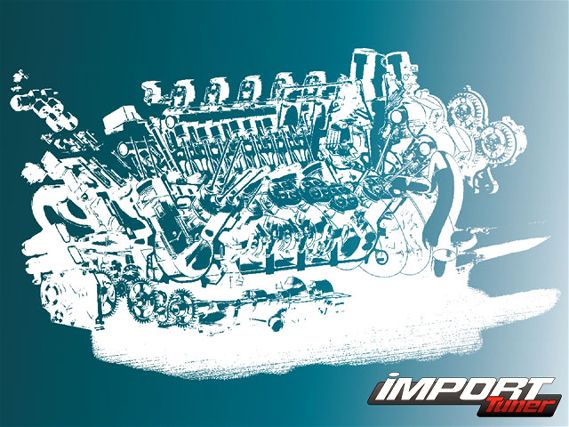 | Eric Hsu Answers - Question It
| Eric Hsu Answers - Question It
Ze-Compression
As a soldier deployed overseas, I've recently developed an affinity for import cars. I've always been an old-school gearhead, but now I have a 350Z and am stockpiling parts to fit it with once I get back home-like the GReddy twin turbo kit that I just picked up. I want to make sure I build the engine right the first time-I have a set of Pauter rods and I found a good machine shop to handle building the engine, but I'm hesitant to order pistons until I've decided on a compression ratio. I know the downfalls of going too high in compression on a boosted engine, but I still want the car to be able to make decent power while not in boost. Is it possible to keep compression between 9.5 and 10.0:1 and still make 500 whp plus on pump gas? How much does dropping compression affect power, disregarding boost? Will tuning on the edge of high compression and boost limit rpm? Thanks in advance.
--SSG Thompson, U.S. Army
Thank you for serving our country, Staff Sgt. Thompson; the least I can do in return is give you a no bullshit answer: If you want to make serious horsepower, high compression turbocharged engines and pump gas do not mix. There are a million variables when tuning a car, but one constant is this: pump gas is shit. Different parts of the country have different qualities of gas, but none of it will give you the advantages of high-octane race gas. In short, there is more power to be made on pump gas by reducing compression, raising boost, and advancing ignition timing, than tuning with high compression. Stick to a compression ratio somewhere in the 8.5-9.0:1 range and your wallet will appreciate it. Why? Because you won't have to empty it again paying to replace an engine that broke from detonation-considering it was built and tuned properly to begin with. The VQ35 is a torquey engine, and although lower compression will cause a bit less power for putting around town, you'll still have decent acceleration, even in vacuum. I recommend the Cosworth 8.8:1 VQ35DE pistons for your project. Cosworth has been designing pistons for high-level racing efforts like Formula 1 for over 40 years-they'd be perfect for any big power, street-driven VQ35 project.
Caught Slippin'
I was driving my '98 Honda Accord LX sedan when out of nowhere, the automatic transmission started slipping in D4, D3, and Second gear. I stopped, put the car in Park and shut it off. I waited a few minutes and started it back up, put it into gear and it pulled perfectly-no slipping. But a few days later it did it again when I was merging onto the highway. I floored it and revs climbed all the way to the rev limiter. I backed off the throttle for a second, floored it again, and the same thing happened. If I can't save my transmission, what other trannies from other cars would bolt up and work with my ECU? Any advice is appreciated-this is my daily driver, so no manual swaps.--Johnny, from Tenn.
Chances are that the only other transmissions that will bolt up and work are the units out of other similar year and model Accords. Even then, your best bet is to have your trans rebuilt by a reputable transmission shop and call it a day. If you're on a budget, you can probably find a cheap one from a junkyard that offers a warranty of some sort. The Accord is for driving from point A to point B with five passengers seated somewhat comfortably in it and nothing more. You should keep it that way, too.
Newb School
Hi, I know you don't want to hear about someone's personal life, but I was hoping you could give me some advice. I want to become a mechanic, but I want to learn how to tune and work on performance cars, not change oil for little old ladies all day. What would be the best route to take? What's the best way to learn about cars in general, aside from reading the full factory service manual cover-to-cover? I'm still new at this, but am interested in learning more.
--Anonymous, via importtuner.com forums
 | Eric Hsu Answers - Question It
| Eric Hsu Answers - Question It
Read, read, and read some more. To master something, you must understand it. Be sure you understand the four cycles of combustion in the automotive internal combustion engine first-read a few books on the subject, rather than believing what some idiots in the forums tell you is true. Then, if you want to tune and master fuel injection, the first thing to do is to read Bosch Fuel Injection and Engine Management by Charles O. Probst; Bosch pretty much invented modern fuel injection theory, so the information in this book is extremely far-reaching. Finally, get a laptop and a high quality wideband 02 sensor, and start tuning ECUs after reading the ECUs' instruction manuals. The more experience you have, the closer you will get to mastering fuel injection and engines, but it's a never-ending process. I took this route 20 years ago, and I'm still learning new tricks everyday.
Tached-out
I have a '93 Acura Integra and I want to get higher rpm out of my engine, but I don't want to without busting something. I'd also prefer not to spend too much money. Can you help?--Anonymous, via importtuner.com forums
Hey I'd like to have a nice, big ass, juicy steak at Morton's for $5, but that isn't going to happen either.
You have questions? We don't care. Fortunately for you, Eric Hsu does. And even if it's only so that he can bust your balls in print, he looks forward to answering your toughest tech questions each month. In a bind? Drop Eric a line! Unless, of course, you're planning to ask him how to de-fog your Grand-Am's euro taillights, or what a fair price for second-hand Cavalier battle wings would be. On second thought...send any questions along those lines in, too. We could all use a good laugh!
For questions, or problems of your own, email them to [email protected].
